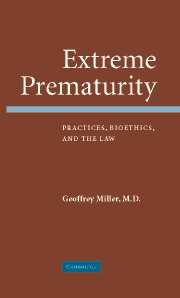Book contents
- Frontmatter
- Contents
- Part 1 THE EXTREMELY PRETERM INFANT: EPIDEMIOLOGY, PERCEPTIONS, AND PRACTICES
- Part 2 BIOETHICS
- Part 3 REPORTS, OFFICIAL OPINIONS, AND GUIDELINES
- 23 United States
- 24 Canada
- 25 United Kingdom (UK)
- 26 France
- 27 Italy
- 28 Germany
- 29 International
- Part 4 THE LAW
- Part 5 EPILOGUE: TRUTH, TRUST, AND BOUNDARIES
- References
- Index
25 - United Kingdom (UK)
Published online by Cambridge University Press: 23 September 2009
- Frontmatter
- Contents
- Part 1 THE EXTREMELY PRETERM INFANT: EPIDEMIOLOGY, PERCEPTIONS, AND PRACTICES
- Part 2 BIOETHICS
- Part 3 REPORTS, OFFICIAL OPINIONS, AND GUIDELINES
- 23 United States
- 24 Canada
- 25 United Kingdom (UK)
- 26 France
- 27 Italy
- 28 Germany
- 29 International
- Part 4 THE LAW
- Part 5 EPILOGUE: TRUTH, TRUST, AND BOUNDARIES
- References
- Index
Summary
In the UK, in 1997, the Royal College of Paediatrics and Child Health issued guidelines on foregoing life-sustaining treatment for children.(240) These were based on a best interests approach. Five situations were given where the foregoing of life-sustaining treatment might be considered:
Brain death
Permanent vegetative state
The “no chance” situation. The child has such severe disease that life-sustaining treatment simply delays death without significant alleviation of suffering. Medical treatment in this situation may thus be deemed inappropriate.
The “no purpose” situation. Although the patient may be able to survive with treatment, the degree of physical or mental impairment will be so great that it is unreasonable to expect them to bear it. The child in this situation will never be capable of taking part in decisions regarding treatment or its withdrawal.
The “unbearable” situation. The child and/or family feel that in the face of progressive and irreversible illness further treatment is more than can be borne. They wish to have a particular treatment withdrawn or to refuse further treatment irrespective of the medical opinion on its potential benefit.
Some might find the language used in these guidelines unsuitable (no purpose, no chance). Be that as it may, situation 4 demands specific accurate prognosis, is vague, and requires value judgments.
In 2000, the British Association of Perinatal Medicine (BAPM) issued a memorandum concerning fetuses and newborns at the threshold of viability.
- Type
- Chapter
- Information
- Extreme PrematurityPractices, Bioethics and the Law, pp. 110 - 115Publisher: Cambridge University PressPrint publication year: 2006



